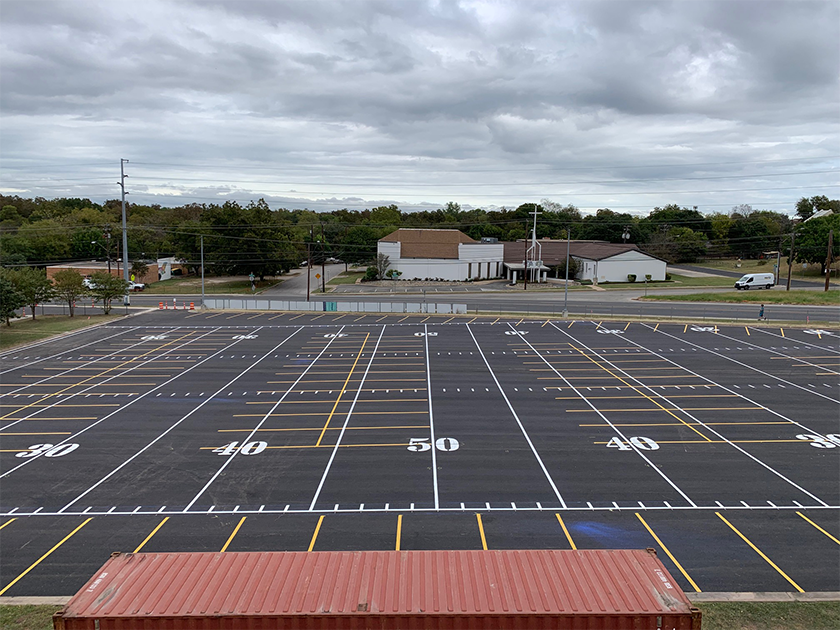Key Takeaway:
Asphalt Sealers: Asphalt sealers improve pavement appearance and extend lifespan, with asphalt emulsion sealers being the preferred option.
Asphalt Emulsion Sealant: Made by mixing asphalt with water, it forms a tough protective layer once applied to pavements.
Coal-Tar vs. Asphalt Emulsion: Coal-tar sealants are banned in many areas due to health risks. Asphalt emulsion is safer for the environment and people.
Effectiveness: Properly applied asphalt emulsion sealers provide excellent protection when done by experienced contractors.
Application Frequency: Pavements in Central Texas typically need sealing every 2-3 years.
Alpha Paving: Alpha Paving offers expert sealcoating and paving services across Central Texas.
Understanding Asphalt Emulsion Sealers
Whether a school installs a blacktop play area, a business installs an asphalt parking lot, or a subdivision installs asphalt streets, the new pavement will be smooth, dark, and attractive. Periodic applications of an asphalt sealer can help pavements retain their visual appeal, but these sealers also help pavements have longer lives with fewer costly repairs. Over the years, manufacturers have produced various sealants, but many of these formulas have fallen out of favor in recent decades and have been replaced by asphalt emulsion sealants.
What Is an Emulsion?
Emulsions are mixtures that contain at least two liquids that are typically unmixable. One example of an emulsion is a salad dressing containing both oil and vinegar that you must shake before using. However, some emulsions tend to remain mixed unless exposed to a significant temperature change; butter and mayonnaise are examples of this type of emulsion.
What Is an Asphalt Emulsion Sealant?
Asphalt is famous for its ability to repel water, but sealcoating contains a great deal of water. To create an asphalt-based emulsion, manufacturers incorporate an emulsifying agent so that the asphalt and water will mix together. The resulting liquid can then be spread over the top of an asphalt pavement, where it will form a tough shell over the pavement when the sealant evaporates the water in the mix.
Are Coal-Tar Sealants Also Asphalt Emulsions?
No, coal-tar based sealants belong in a separate category. Sealants made with coal tars contain high levels of polycyclic aromatic hydrocarbons, or PAHs. Several states and many cities, including Austin, have banned refined-tar sealants, so local asphalt paving companies cannot apply these products. Many PAHs are known or suspected carcinogens, and runoff from tar-based sealants can have a devastating impact on fish as well as the animals that eat them. As they wear away and turn to dust, refined-tar sealants can become airborne, infiltrating homes and business, or they can contaminate the soil, be picked up on shoes, and carried indoors. Asphalt emulsion sealers are much kinder to the environment and safer for humans, pets, and wildlife.
How Effective Are Asphalt Emulsion Sealers?
If you hire a reputable and knowledgeable asphalt sealcoating contractor, you can expect excellent results from an asphalt emulsion sealant. Asphalt-based sealants are not as forgiving as refined-tar sealants, so contractors must pay careful attention to preparing the mix properly. There are also some differences in the application methods and parameters that an unscrupulous or inexperienced sealcoating contractor could overlook.
How Often Should My Contractor Apply an Asphalt Emulsion Sealant?
Your contractor will need to recommend the appropriate schedule for your asphalt pavement. Typically, regardless of the type of sealant, most parking lots in Central Texas need to be sealed every two or three years.
Ask Alpha Paving
Alpha Paving is the preeminent asphalt sealcoating contractor in the state, serving customers in most Central Texas counties. We also offer road construction, asphalt crack repair, parking lot striping, concrete repair, asphalt paving, thermoplastic pavement markings, asphalt overlays, parking lot signs, asphalt milling, concrete installation, pothole repair, and parking lot wheel stops. Our clients include property management firms, health care facilities, cities and counties, restaurants, educational facilities, apartment complexes, hotels, airports, religious institutions, office parks, shopping malls, and entertainment venues. If you are interested in obtaining a free quote from a company with an exemplary reputation, submit our online request form. You can also phone our office in Round Rock at 512-677-9001 if you would prefer to discuss your paving needs in more detail.




